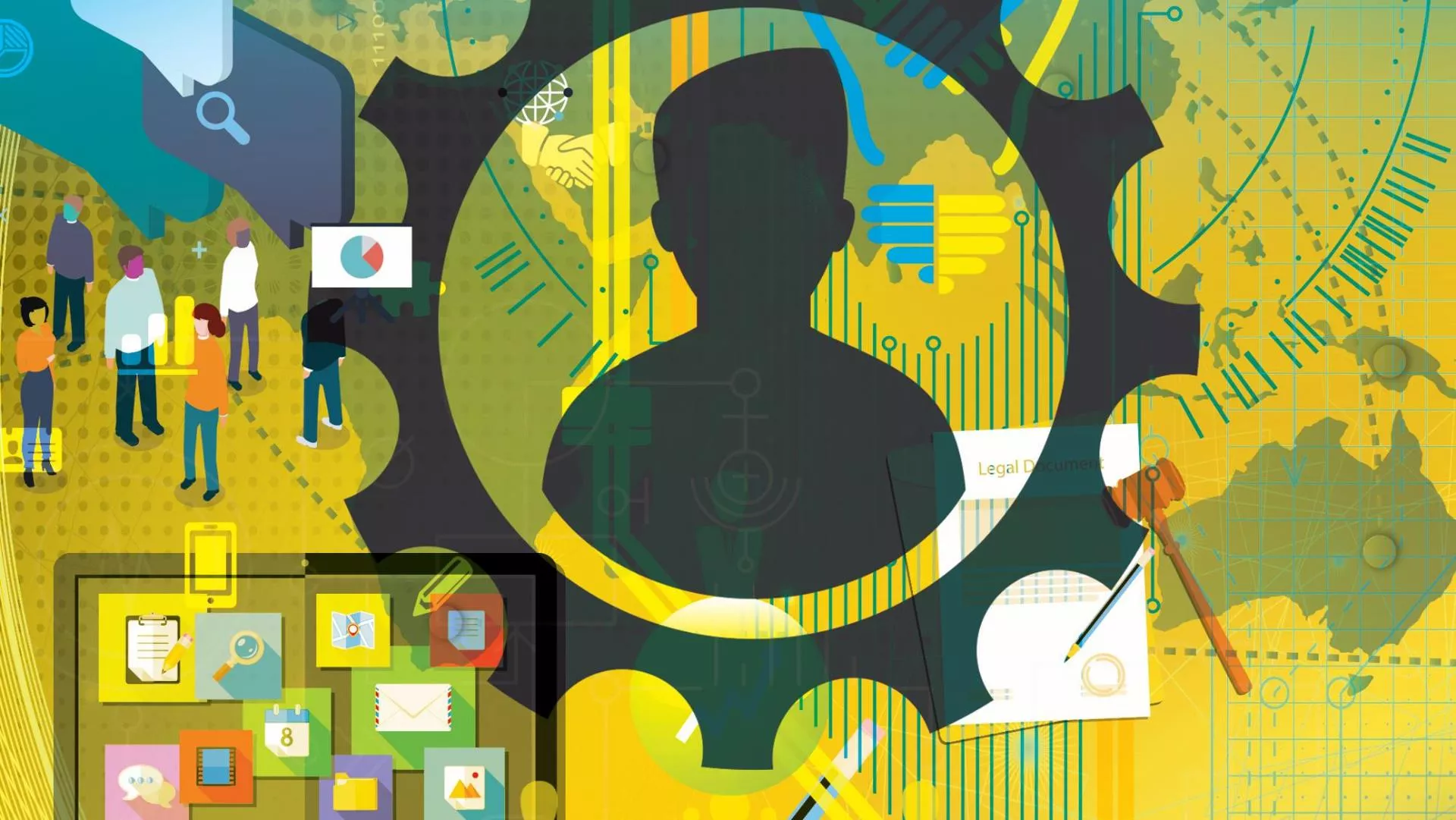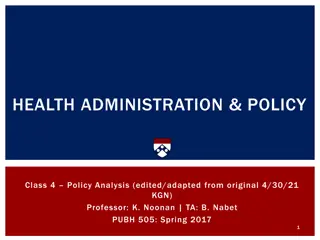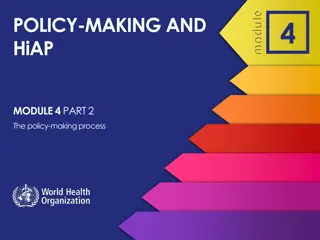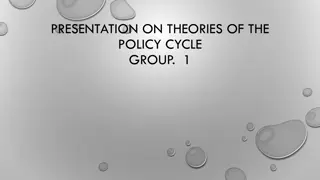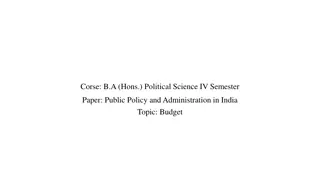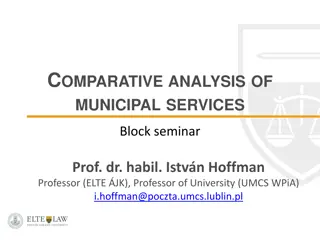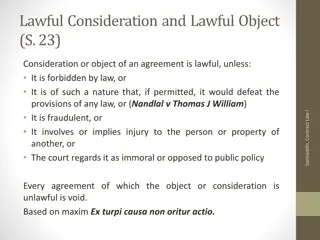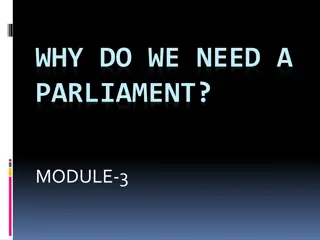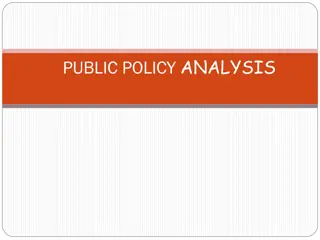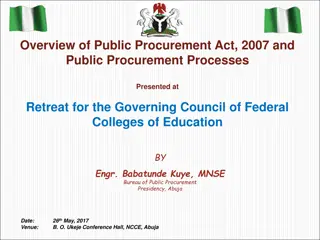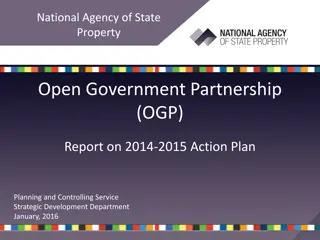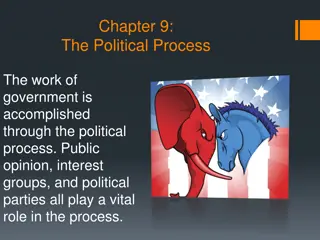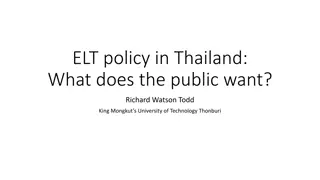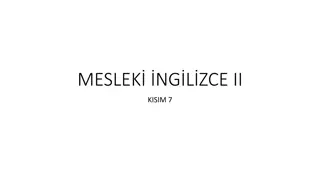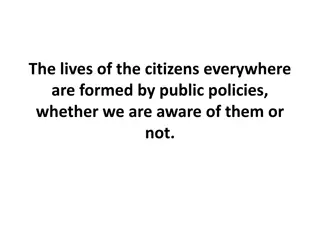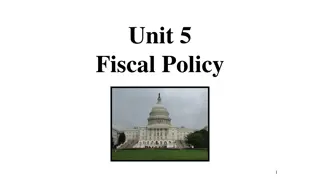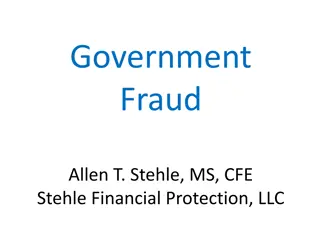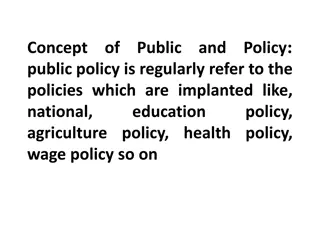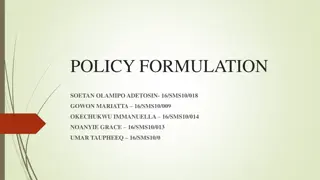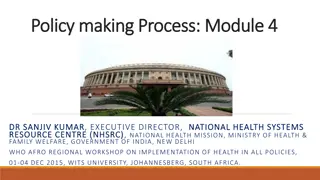Understanding Public Policy-Making Process in Government
Explore the intricacies of public policy-making in government administration, focusing on the importance of providing equal access to basic services for all citizens. Delve into the nature of public policy, factors influencing policy-making, and the procedural aspects involved, including planning, objective determination, decision-making, and policy analysis. Discover the key institutions involved in shaping and implementing policies for the betterment of society.
Download Presentation

Please find below an Image/Link to download the presentation.
The content on the website is provided AS IS for your information and personal use only. It may not be sold, licensed, or shared on other websites without obtaining consent from the author. Download presentation by click this link. If you encounter any issues during the download, it is possible that the publisher has removed the file from their server.
E N D
Presentation Transcript
Module 1 - Policy and Policy-Making INTRODUCTION The SA Constitution states that government authorities and officials must ensure that all citizens, especially the poor, and other vulnerable groups, have equal access to basic services. Public policy is therefore necessary to determine which services communities need and what kinds of development are needed. www.futuremanagers.com
Module 1 - Policy and Policy-Making (continued) THE NATURE OF PUBLIC POLICY A set of common rules and guidelines have emerged over time, which has enabled communities to deliver basic services and to manage any differences which exist among individuals and groups effectively. www.futuremanagers.com
Module 1 - Policy and Policy-Making (continued) PLANNING, DETERMINING OBJECTIVES, DECISION-MAKING AND POLICY-MAKING Planning is a thought activity that involves the individual and/or group s imagination, logic and vision. Objectives define and state the purpose of an institution. Policy-making is the process in which actions and interactions are taken by all spheres and levels of government in the interest of all citizens. www.futuremanagers.com
Module 1 - Policy and Policy-Making (continued) FACTORS THAT INFLUENCE POLICY-MAKING Internal factors include: Conditions of establishment; Political assignment; Legality according to the state and administrative law; Financial means; Personnel abilities; and Physical facilities. External factors include: Circumstances; Needs and expectations of the population; Policies of political parties; Activities and representations of interest groups; Personal views of political executive office- bearers; and Research, investigations and views of experienced public officials. www.futuremanagers.com
Module 1 - Policy and Policy-Making (continued) POLICY-MAKING PROCEDURE The policy-making process can be divided into three groups, namely: The policy-making processes; The policy-implementation processes; and Policy analysis and evaluation processes. www.futuremanagers.com
Module 1 - Policy and Policy-Making (continued) INSTITUTIONS INVOLVE IN POLICY-MAKING The following institutions are involved in determining a policy: Legislative institutions; Executive councils and committees; Commissions and committees of enquiry; Select, standing and joint committee of parliament; Cabinet committees; and Internal auxiliary services and staff units. www.futuremanagers.com
Module 1 - Policy and Policy-Making (continued) POLICY LEVELS Policy-making take place on four levels namely: Political-party policy; Government policy; Departmental policy; and Administrative policy. www.futuremanagers.com
Module 1 - Policy and Policy-Making (continued) CHARACTERISTICS OF PUBLIC POLICY Public policy must be: Authoritative; Enforceable; Flexible and adaptable; Feasible; Clear; and Public. www.futuremanagers.com
Module 1 - Policy and Policy-Making (continued) ROLE PLAYERS IN PUBLIC POLICY-MAKING There are numerous role players involved in policy-making. These include but are not limited to: The population; Individuals; Interest or pressure groups; Legislative institutions; and Political executive institutions. www.futuremanagers.com
Module 1 - Policy and Policy-Making (continued) CONCLUSION It is important for policy-makers to have the necessary capacity and opportunity to continuously adapt public policy to the changing circumstances of the people. www.futuremanagers.com
Module 2 - Organising INTRODUCTION An organisational unit or an institution within the public sector consists of people who have to co-operate with each other to achieve political objectives. www.futuremanagers.com
Module 2 - Organising (continued) WHAT IS ORGANISING? Organising takes place when all tasks and responsibilities and functions are grouped together to achieve the goals of the organisation. Positions must be arranged in such a way that the personnel are willing to co-operate with each other to achieve an objective. www.futuremanagers.com
Module 2 - Organising (continued) POLITICAL FACILITATION The country is strongly managed by political parties. These functions include: Legislative; Executive; and judicial functions. www.futuremanagers.com
Module 2 - Organising (continued) ORGANISATIONAL THEORIES There is the: Classical classification theory which states that the main purpose of an organisation unit is to carry out duties directed by political office-bearers (public sector approach); and the Modern/contemporary classification theory which states that the main purpose is to make a profit (private sector approach). www.futuremanagers.com
Module 2 - Organising (continued) INTERNAL ORGANISATIONAL ARRANGEMENTS Vertical assignment of authority: Horizontal division of work: www.futuremanagers.com
Module 2 - Organising (continued) AIDS IN ORGANISING The organising process has to be done in writing; Organisational charts, manuals and procedure codes can be used to communicate important information to staff members; and All the functions performed by public officials must be accounted for. www.futuremanagers.com
Module 2 - Organising (continued) ORGANISATIONAL SYSTEMS There are three types of systems which can be used in an organisation: The line system; The functional system; and The line and staff organisation. www.futuremanagers.com
Module 2 - Organising (continued) CONCLUSION Every organisation needs a structure in order to operate efficiently. Hierarchical structures can be used by an organisation if the structure fits into the nature of the workload. Delegation is also important as one of the core concepts of management and leadership. www.futuremanagers.com
Module 3 - Financing INTRODUCTION The government s financial status works exactly like any individual person s account; it can only spend what was received during the previous financial year. The budget is important to consider as it outlines new policies which should be to improve the general welfare of all South Africans. www.futuremanagers.com
Module 3 Financing (continued) NATURE OF STATE FINANCES The state does not have its own money; it is the money belonging to the public. The state has a strict budget, with which activities have to be organised. Each financial year, the state budget starts at R0,00 and is estimated over a period of 12 months. www.futuremanagers.com
Module 3 Financing (continued) GENERAL FINANCIAL THEORIES Specific theoretical frameworks have been developed for government finance. These frameworks explore: Government funds (which are public funds); State departments; State budget; and The financial year as a fixed period. www.futuremanagers.com
Module 3 Financing (continued) PHASES OF STATE FINANCES The budget can be divided into four phases, namely: The preparation phase; The approval phase; The execution/implementation phase; and The control phase. www.futuremanagers.com
Module 3 Financing (continued) CHARACTERISTICS OF THE STATE BUDGET The state budget has the following characteristics: It is a policy document; It is a working programme; It stands as a source of information; and It is an instrument of control. www.futuremanagers.com
Module 3 Financing (continued) INSTITUTIONS CONCERNED WITH STATE FINANCES The following institutions play an insignificant role in government finance: Parliament; Accounting officers; Joint committee on public accounts; Departmental accountants; Department of State Expenditure; The Auditor-General; The South African Reserve Bank; Legislators; and The Minister of Finance; Financial and Fiscal Commission. www.futuremanagers.com
Module 3 Financing (continued) TYPES OF BUDGETS Budgets can be classified according to: Type: Period: Income budgets; Main budget; Expense budgets; and Supplementary budget; and Capital budgets. Additional budget. www.futuremanagers.com
Module 3 Financing (continued) SOURCES OF INCOME OF THE STATE The sources of income of the state can be classified as follows: Revenue from state enterprises/profitable Fines and bail forfeitures; institutions; Taxes; Interest on dividends; Loans; and Levies; Special funds and accounts. License fees; www.futuremanagers.com
Module 3 Financing (continued) FINANCIAL CONTROL Managing government finances is critical important to ensure that quality services are provided to the people. www.futuremanagers.com
Module 3 Financing (continued) CONCLUSION Governmental finances are connected to all the activities of the government. Adequate service delivery should be based on adequate funding and proper budgeting and planning. Political executive institutions have a responsibility to manage their budgets effectively so that they become accountable, responsible and transparent within the legal framework. www.futuremanagers.com
Module 4 - Personnel Administration INTRODUCTION The staffing of public institutions involves all generic activities which constitute the functions of personnel officials. These functions include: Personnel policy and procedures; Personnel financing; Personnel organisation; Personnel control; and Personnel management. www.futuremanagers.com
Module 4 Personnel Administration (continued) PERSONNEL HUMAN RESOURCE SYSTEMS The following systems have developed over the years and have been in force in many countries: Aristocratic system; Democratic system; Spoils system; and Merit system. www.futuremanagers.com
Module 4 Personnel Administration (continued) PERSONNEL/HR ADMINISTRATION The personnel administration refers to the total involvement of human resources in a public institution. Personnel administration covers two areas: Functionally specialised activities; and Administrative activities. www.futuremanagers.com
Module 4 Personnel Administration (continued) GENERIC PERSONNEL-ADMINISTRATIVE FUNCTIONS These functions include the following: Determining policy; Organising; Staffing Financing; Work procedures; and Control. www.futuremanagers.com
Module 4 Personnel Administration (continued) FUNCTIONAL PERSONNEL ADMINISTRATIVE FUNCTIONS These functions include the following: Establishment of posts; Promotion; Recruitment; Transfer and reassignment; Placement of candidates; Termination of service and Trial appointments; retirement; and Evaluation of work performance; Affirmative action. www.futuremanagers.com
Module 4 Personnel Administration (continued) SUPPORT FUNCTIONS The government grants officials additional benefits which are generally referred to as fringe benefits. Determining service benefits should be done with insight and skill to prevent unnecessary conflict www.futuremanagers.com
Module 4 Personnel Administration (continued) CONLUSION A personnel policy can be beneficial to both an organisation and the employees. Service benefits should be provided to employees in order to create a sense of loyalty to the employer and indicate the employer cares for their wellbeing. www.futuremanagers.com


